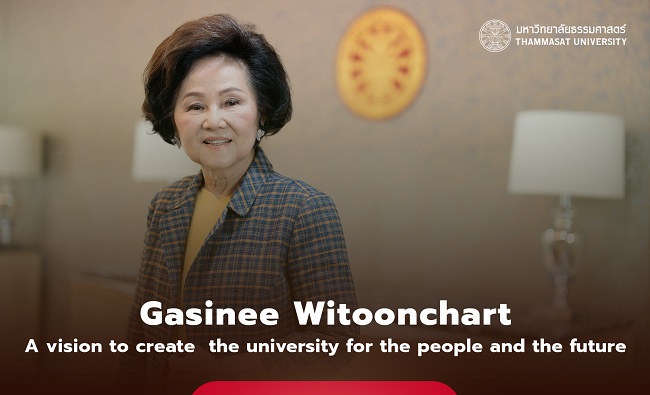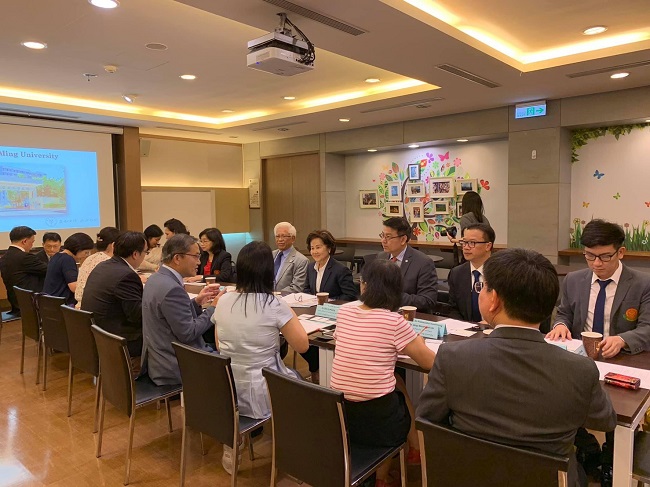Gasinee Witoonchart set a vision to create the university for the people and the future
Thammasat rector Gasinee Witoonchart set a vision to create the university for the people and the future, and as a part of solutions for the global challenges.
Tuesday 17 August 2021

Under the leadership of rector Gasinee Witoonchart, Thammasat University has risen as one of the major players fighting the Covid-19 pandemic.
The field hospital is one of the university's initiatives widely recognised by the public. Since last year, medical staff and students from the university's hospital have set up and run a field hospital, with over 300 beds capacity, at its Rangsit campus in Pathum Thani province to provide people's access to coronavirus tests, treatment, and vaccination.
The university has also led the execution of many other initiatives and innovations, including the successful development of waterproof face masks and medical equipment delivery robots to assure the safety of medical staff at the frontline.
Being a part of solutions in the ongoing national health crisis illustrates Thammasat's vision to be the university "for the people" and "for the future" Ms Gasinee has put relentless effort into envisaging the vision while encouraging Thammasat's collaboration with multi sectors and players to achieve this goal.
"The pandemic has revealed the world's uncertainty that forces many individuals and countries into vulnerability. We are and will be living with this uncertainty in the years to come. There are many challenges we need to tackle along the way, including inequality, aging society, depleting natural resources, and climate change," she said.
"The university has a role in preparing students and people from across the spectrum for these challenges while equipping them with skills to handle this uncertainty and seize arising opportunities in the future market. We also have a role in building new leaders who can tackle these challenges, stay relevant and be part of solutions."
Becoming Thammasat University's rector since 2017, Ms Gasinee has set three missions to realize the university's vision --- adopting innovation and new technology in the university's operation and teaching; building new leaders; maintaining Thammasat's spirit to serve the people and the society, and translating this spirit into every study program, course and activity.
These missions have been integrated into every aspect of the university, from its operational management, projects and initiatives, and research to campus life.
On Thammasat Rangsit campus, which covers nearly 1,800 rais, electricity used in buildings is generated from solar panels reflecting the university's effort to tackle climate change. It is also building the largest urban rooftop farm in Asia, covering 22,000 square meters, as a place for students and the public to learn about climate resilience and food security while creating green public space for surrounding local communities.
The university has invested in research and development in numerous areas, including food processing, healthcare, artificial intelligence, and data analysis. Students have access to co-working spaces within the campus, which can serve more than 3,000 users, where they can share ideas and collaborate --- one of the skills required to be successful leaders.
Ms Gasinee's motivation to reinvent Thammasat for the people and the future comes from her close ties with the university. She spent her student years in Thammasat Business School, where she obtained a bachelor's degree in business administration.
Then she completed her master's in business administration from the University of Texas at Austin in the United States. She became a lecturer at Thammasat and Dean of Faculty of Commerce and Accountancy in the 1990s while advising some private companies and government offices.
"Thammasat is like my second home, and I want to improve this home to be a better place for everyone," she said.
While being the rector, she has refused to be paid. She has diverted all her salaries to the university's emergency fund, which supports the work of Thammasat University Hospital, and directs to help staff and students affected by the Covid-19 pandemic.
Her key to be a successful leader is to look inward to the university to find its strength and weakness while looking outward to the international communities to find new solutions and know-how.
That is seen in her push for upgrading the course contents, quality, and standard of Thammasat Business School, the goal she has pursued since her early days as the dean of the Faculty of Commerce and Accountancy. This goal is even more urgent today when the pandemic has disrupted businesses and the global economy.

"Business management during and in the post-pandemic will completely change. There will be an emergence of new business models that accelerate growth and are resilient to the crisis. Traditional business models will not help companies survive. There will be new jobs, and there will be jobs that disappear forever," said Ms Gasinee.
"Agility or the ability of an individual or an organization to adapt and change quickly in the uncertain and rapidly changing world will be vital for future business success.
Thammasat University must be at the forefront to enhance this ability for individuals, organizations, and even society. We must provide lifelong learning opportunities to everyone, who can access new knowledge and skills everywhere and every time."
The university has launched several online courses to upskill and reskill students, workers, and the general public to adapt to volatile future markets. It has also highlighted the entrepreneurship skills and the adoption of technology and innovation in the business school.
Thammasat Business School received accreditation from three well-known institutions; the European Foundation for Management Development (EFMD), the Association to Advance Collegiate Schools of Business (AACSB), and the Association of MBAs (AMBA).
Ms Gasinee's commitment to improving Thammasat Business School has been recognized by international communities.
Last year, she was among 18 scholars selected for the EFMD Fellows who represent the leadership in global management education and the value of business schools. She is the one and only from Thailand and Southeast Asia.
The EFMD is an international not-for-profit association based in Belgium, with the most extensive network association in the field of management development.
Ms Gasinee believes that her fellow award proves the high potential of Thammasat Business School to be a resource for global academics and university networks. She will also be a bridge that connects Thammasat and Thai universities to international experts to develop high-quality business courses and know-how.
In June, she was appointed to the EFMD board of trustees. She will take part in determining the organization's policy and the criteria for evaluating business schools worldwide.
Her other roles include encouraging collaboration among EFMD institutional members and management development professionals across regions. She will also promote the integration of cross-disciplinary knowledge, competency-focus curricula, diversity and inclusion in management education, and support initiatives to create social innovations to resolve emerging global challenges.
"EFMD comprises members who are executives of private organizations and business schools around the world. This is a good chance for Thailand and Thammasat to improve collaboration with the global networks and build business leaders for the future," she said.
After being appointed, her first task is to lead Thammasat to organize an international conference for universities and private organizations to share best practices.
"I believe in the power of communication and knowledge sharing. Everyone has different experiences and opinions that can complement each other. Everyone has gone through struggles and challenges that give lessons learned," she said.
"The more we communicate and share, the more we learn and get smarter."